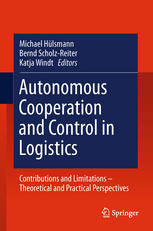

Most ebook files are in PDF format, so you can easily read them using various software such as Foxit Reader or directly on the Google Chrome browser.
Some ebook files are released by publishers in other formats such as .awz, .mobi, .epub, .fb2, etc. You may need to install specific software to read these formats on mobile/PC, such as Calibre.
Please read the tutorial at this link: https://ebookbell.com/faq
We offer FREE conversion to the popular formats you request; however, this may take some time. Therefore, right after payment, please email us, and we will try to provide the service as quickly as possible.
For some exceptional file formats or broken links (if any), please refrain from opening any disputes. Instead, email us first, and we will try to assist within a maximum of 6 hours.
EbookBell Team

0.0
0 reviewsMany new technologies – like RFID, GPS, and sensor networks – that dominate innovative developments in logistics are based on the idea of autonomous cooperation and control. This self-organisational concept describes „...processes of decentralized decision-making in heterarchical structures. It presumes interacting elements in non-deterministic systems, which possess the capability and possibility to render decisions. The objective of autonomous cooperation and control is the achievement of increased robustness and positive emergence of the total system due to distributed and flexible coping with dynamics and complexity“ (Hülsmann & Windt, 2007). In order to underlie these technology-driven developments with a fundamental theoretical foundation this edited volume asks for contributions and limitations of applying the principles of autonomous cooperation and control to logistics processes and systems. It intends to identify, describe, and explain – in the context of production and distribution logistics – the effects on performance and robustness, the enablers and impediments for the feasibility, the essential cause-effect-relations, etc. of concepts, methods, technologies, and routines of autonomous cooperation and control in logistics. Therefore, the analyses collected in this edited volume aim to develop a framework for finding the optimal degree as well as the upper and lower boundaries of autonomous cooperation and control of logistics processes from the different perspectives of production technology, electronics and communication engineering, informatics and mathematics, as well as management sciences and economics.